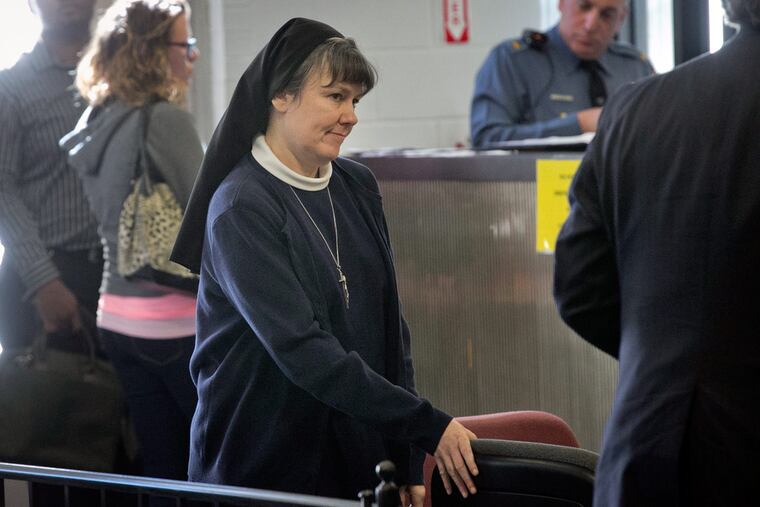Philadelphia nun convicted of DWI
A judge in Gloucester County on Wednesday convicted a Philadelphia nun of driving while intoxicated, rejecting a claim that she had been "sleep-driving" under the influence of medication.

A judge in Gloucester County on Wednesday convicted a Philadelphia nun of driving while intoxicated, rejecting a claim that she had been "sleep-driving" under the influence of medication.
"The court finds the defendant was under the influence of alcohol," Washington Township Municipal Court Judge Martin Whitcraft said in finding Sister Kimberly A. Miller guilty.
Whitcraft flatly rejected the so-called Ambien defense, argued by Miller's lawyers and an expert who said she was "sleep-driving" after an adverse reaction to the drug and should not be held responsible.
The judge immediately suspended her license for 90 days and fined her $257 plus fees. She must complete a 12-hour course for DWI offenders.
Miller, 41, wearing a blue habit and black veil, showed little emotion as she sat at the defense table. A row of nuns from her order, the Sisters, Servants of the Immaculate Heart of Mary, were in court.
Defense lawyer Jeffrey Lindy said he was surprised by the verdict. He said Miller was obviously very upset.
"She's in tears. She's crying," Lindy told reporters.
Lindy said Miller was especially disappointed that the judge said Miller's testimony during the trial last week was not credible.
"She's just very hurt by the judge not believing her. She's a truth-teller," Lindy said.
Miller testified she had taken a 5mg Ambien tablet and consumed a glass of altar wine, and had no recollection of the crash last Nov. 7 that led to her arrest. She said she was unaware of the possible side effects of taking Ambien.
During a nearly six-hour trial last week, Miller said she did not remember driving about 20 miles from St. Veronica's, her North Philadelphia convent, to South Jersey.
Police alleged that she had alcohol on her breath, had slurred speech and bloodshot eyes, and was staggering when she got out of her car. She failed two field sobriety tests and refused to take a third, police said.
In his ruling, Whitcraft said Miller didn't appear to be in a "zombielike state" in dashcam video that he viewed of her arrest. State law does not recognize a pathological intoxication defense, he said. "She didn't appear to be sleepy. She didn't appear that she was under the effect of Ambien."
Miller, a librarian and theology teacher at Little Flower High School for Girls in Philadelphia, was arrested after driving her Chevrolet Impala into an auto repair shop in Washington Township.
The judge Wednesday dismissed four lesser charges at the request of prosecutor Scott Burns.
The Ambien defense has been used for about 10 years by lawyers around the country with mixed success. In one of the earliest such cases, an appeals judge overturned a Somerset County woman's drunken-driving conviction in 2009, finding that she had no way of knowing sleep-driving was a potential side effect of the drug.
But Whitcraft noted that incident occurred in September 2006, six months before Ambien and other makers of insomnia drugs were ordered to include a warning that the pills could leave patients susceptible to sleep-driving.
"We maintain that there's a carved-out exception when you have no knowledge of what you're doing because you took a legitimate prescription medication. . . . That's different than going to a bar, getting so drunk you walk out, you fall on your face, you get in a car, you drive," Lindy said.
Miller admitted drinking wine at least five nights a week to help her sleep. She said she rarely took Ambien, which was prescribed to treat chronic arthritis.
Miller said she lost four hours of her life after going to bed at the convent, where she has lived for 17 years. Earlier that night, Miller said, she attended a book fair in Haverford, where she had "two small glasses of wine."
When she woke up, she was handcuffed at the Washington Township police station, Miller said. She was charged with driving under the influence, reckless driving, and leaving the scene of an accident. Her blood-alcohol level was twice the legal definition of drunken driving in New Jersey.
Whitcraft tossed the blood-alcohol test results because police failed to observe Miller continuously for 20 minutes before administering the Breathalyzer test.
Police said a half-empty corked bottle of wine was in the backseat of her car. A defense witness said she gave Miller the wine bottle at the book fair and that it had been half-consumed there. The judge rejected that testimony in his ruling.
No decision has been made on a possible appeal, Lindy said. The sisters from her convent will pay the fine if the case is upheld, he said.
Miller was placed on administrative leave from Little Flower by the Philadelphia Archdiocese. A petition seeking to have her reinstated has received thousands of signatures.
In a statement Wednesday, Kenneth Gavin, an archdiocesan spokesman, said the Office of Catholic Education and Miller's religious order will review the matter.
"No change has yet been made to her status. She remains on administration leave from her teaching duties," the statement said.
856-779-3814 @mlburney